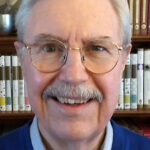By Barb Arland-Fye
A white, rectangular box with a card tucked into a red envelope appeared to be waiting for me to open on the eve of Valentine’s Day. Guilt set in. My husband Steve purchased a gift and card for me; I had a simple card, which I created for him on our desktop computer. He probably caught a glimpse of the card in progress! No gift. My excuses — a pandemic, bitter cold weather, busy workdays and evenings.

Steve’s card and inexpensive gifts delighted me. My card delighted him, but I regretted not taking the time to reflect on a gift he might appreciate (model railroad accessories, for instance). Easily purchased online.
Earlier this month, Bishop Thomas Zinkula shared with listeners of The Catholic Messenger Conversations podcast what he planned to do during Lent. He said he was reading “Let Us Dream,” the new book by Pope Francis that reflects, in part, on the crises in our lives and how those crises shape us. We come out of a crisis better or worse, but never the same, the pope says. We need to examine the crises in the midst of a bigger crisis — a pandemic.
“Lent can be a time to dream and to rethink our priorities, what we value, what we want, what we seek,” Bishop Zinkula said. “I think we can do that in a deeper way this year.” Through prayer, fasting and discernment, he plans to reflect on the things he needs to change in his life. We take into Lent all of the practices we engage in as people of faith, but with greater intensity.
The bishop sees the pandemic as an extended Lenten journey, with hope on the horizon because of a vaccine aimed at eradicating the persistent virus. Our hope as Christians, he points out, is even greater because of the resurrection of Christ.
Avoid doing a myriad of things during Lent, the bishop advises. He later shared with me a quote from the late Father Thomas Merton, an American Trappist monk, writer, theologian, mystic and social activist, on the pressures of modern life. Father Merton died in 1968, but his observation is something I plan to reflect on this Lent:
“The rush and pressure of modern life are a form, perhaps the most common form, of its innate violence. To allow oneself to be carried away by a multitude of conflicting concerns, to surrender to too many demands, to commit oneself to too many projects, to want to help everyone with everything is to succumb to violence.”
Am I succumbing to violence by saying “yes” to too many demands? I am not sure that my “busy-ness” causes me to succumb to violence. However, I do know that my reluctance to say no for fear of disappointing anyone sometimes shortchanges my relationships with others and with God.
On Valentine’s Day — World Marriage Day — I visited the For Your Marriage website (www.foryourmarriage.org) and found the following “Daily Marriage Tip,” which relieved my guilt regarding my “gift” to Steve:
“Merchants make a big deal out of Valentine’s Day. Flowers, chocolate, and cards are nice, but often a moneyless gift from the heart can be more precious. Be creative. Surprise each other. You can still do chocolate!”
The Valentine’s Day card I created for Steve included a Scripture verse read at our wedding nearly 36 years ago:
“Love is patient, love is kind. It is not jealous, [love] is not pompous, it is not inflated, it is not rude, it does not seek its own interests, it is not quick-tempered, it does not brood over injury, it does not rejoice over wrongdoing but rejoices with the truth. It bears all things, endures all things” — (1Corinthians 13:4-7). I have added that verse to my prayers this Lent.
(Contact Editor Barb Arland-Fye at arland-fye@davenportdiocese.org)











